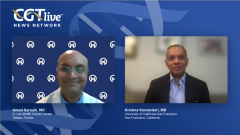
Tumor-Infiltrating Lymphocyte Therapy: Clinical Data on Biologic Activity
A focused discussion on clinical trial data presented at SITC 2022 elucidating the biologic activity of tumor-infiltrating lymphocyte therapies.
Episodes in this series

Transcript:
Amod Sarnaik, MD: To wrap up this session, we’ve selected a couple of e-abstracts from SITC [Society for Immunotherapy of Cancer] Annual Meeting to discuss. The first abstract involves CD4 polarization on TIL [tumor-infiltrating lymphocyte] therapy. Let’s start with that 1.
Krishna Komanduri, MD: When we do apheresis for a CAR [chimeric antigen receptor] T-cell product, we’re just getting T cells, which are then genetically modified. You were part of this abstract, so I’d love to hear your thoughts about it. To me, it talks about the characteristics of the T-cell product as harvested, what we learned from the numbers of TILs that were expanded and infused into the patient, and the correlations between subsets of TILs or T cells in the harvested product and outcomes. I’d love to hear your thoughts, and then I can tell you my thoughts as somebody who’s been a translational immunologist for a long time.
Amod Sarnaik, MD: This was a collaboration between myself at Moffitt Cancer Center, David Woods and his team at the University of Colorado, and Jeff Weber at New York University. It adds to a body of knowledge that the TIL contained within the TIL products are not uniform but are polarized, and we believe that this polarization may be exploited to improve responses.
There’s no question that we need to do more work on T-cell biology to tease out the details, but there are unique aspects, especially with the CD4 TIL, where some expression or epigenetic modifications may lead to lower TIL numbers in the TIL product. We all know that a lower TIL count in the product is associated with lower responses. Ways of polarizing the TIL during the TIL propagation may improve the TIL yield, tumor reactivity, persistence, and ultimately lead to long, durable patient outcomes. However, I suspect that there’s a lot more complexity to the T-cell phenotype as it affects antitumor biology. We’re working hard to expand on this knowledge.
Krishna Komanduri, MD: One cool thing you did in that paper was look at different subsets of T cells that are known to be polarized with different functions, and you also looked at regulatory T cells. Regulatory T cells are a subset of the CD4 T cells, or healthy T-cell response, that are important in preventing our immune response to cause autoimmunity. We might get a crazy immune response responding to a virus, but we don’t get autoimmunity after getting the flu or COVID-19. The reason is that we expand these regulatory T-cell subsets, which are natural breaks to our immune response.
One thing this study showed is that there may be natural regulatory populations within the TIL subset that may decrease the expansion of that. Obviously, we don’t have a choice. We have the T cells that come from the patient, and those are the ones that are expanded. But if we learn what aspects of that composition are associated with better expansion and better in vivo activity, then we might be able to manipulate that product or expansion process to yield a more effective product, which is less likely to be suppressed. We’re going to talk a little later in our discussion about other abstracts that are more actively trying to achieve that as well, but I thought it was a very good study. Congratulations.
Amod Sarnaik, MD: Thank you. For a final word on this abstract before we move forward, in the past, NCI [National Cancer Institute] did a study in which all the CD4 was depleted from the TIL product. In fact, this got lower responses. There are subsets of CD4 that clearly are deleterious, but there are also subsets of CD4 that are quite beneficial for tumor response.
Transcript edited for clarity.
Newsletter
Stay at the forefront of cutting-edge science with CGT—your direct line to expert insights, breakthrough data, and real-time coverage of the latest advancements in cell and gene therapy.














